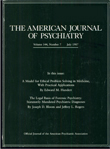Clinical Correlates of Memory in Schizophrenia: Differential Links Between Depression, Positive and Negative Symptoms, and Two Types of Memory Impairment
Abstract
OBJECTIVE: This study investigated clinical correlates of memory impairment in schizophrenic patients. In particular, the authors hypothesized that depressive symptoms would be linked to memory efficiency, as found in other clinical populations. In addition, they tested Frith's pathophysiological model predicting links between negative symptoms and failure to respond, as well as between positive symptoms and production of erroneous responses. METHOD: Thirty-one patients were given several memory tasks: long-term free recall of nonorganizable and organizable lists in immediate and delayed conditions, recognition in immediate and delayed conditions, implicit memory (stem completion task), and short-term memory (digit span). Superficial encoding of information was also assessed by the ability to recall the items sequentially; deep encoding was assessed by the ability to organize the items according to their semantic properties. Two types of memory measures were individualized: measures reflecting memory efficiency and measures reflecting production of erroneous memory responses (intrusions, perseverations, false alarms). RESULTS: Consistent correlations appeared between severity of depressive symptoms and measures reflecting deep but not superficial encoding; none, however, was correlated with negative symptoms. Two of the three types of erroneous memory responses were positively linked to positive symptoms. CONCLUSIONS: Efficiency of memory processes relying on deep encoding seemed linked to depressive symptoms. In addition, the two distinct types of impairment predicted by Frith's model were found. The expected link of one with positive symptoms was verified, but the link of the other with negative symptoms was not. (Am J Psychiatry 1997; 154:1538–1543)



